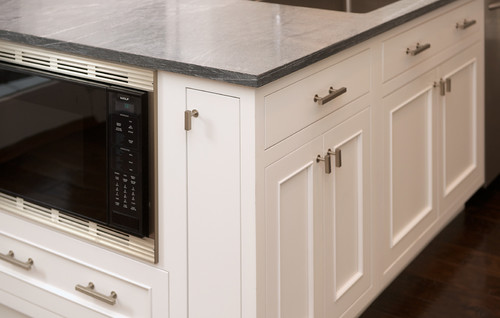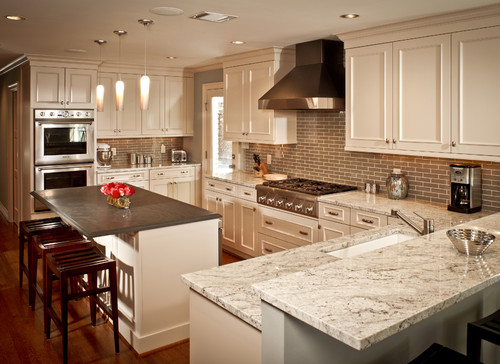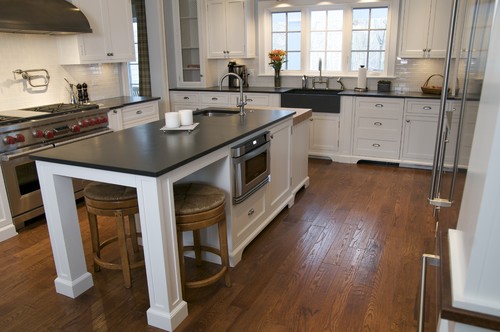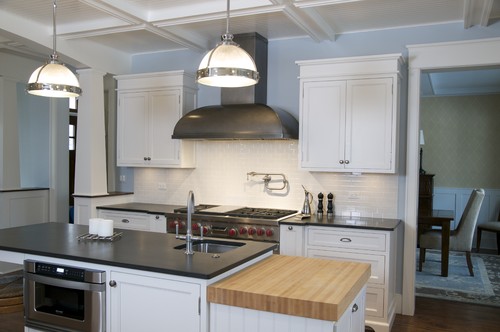Slate Countertops: Making a Beautiful Comeback
Slate countertops are making a comeback!
Once a more popular choice for homeowners, slate countertops fell out of favor as other materials became more desirable. But now, slate is seeing a resurgence in popularity as homeowners are once again considering this natural stone option.
Slate comes in a variety of colors and has both pros and cons compared to other materials like granite, quartz, or marble.
Slate is relatively affordable, and while it does require some extra care and maintenance, it is overall a very solid choice for kitchen counters, especially if you are drawn to its subdued aesthetic.

Natural stone of any type has a unique look and feel that no other material can equal. It’s showy, luxurious, and, of course, pricey. However, slate is unlike any other stone.
If you are considering slate countertops read on for everything you need to know!

What is Slate?
Slate is a type of metamorphic rock that is made of clay or volcanic ash. It is found in many different parts of the world and has been used for centuries in a variety of applications, including the construction of roofs and floors. Slate is very durable, which is why it is often used in construction or on a building’s exterior.
Slate countertops are made from thin pieces of slate that have been cut and polished to create a smooth surface.
Countertops made of slate are quite resistant to scratches and stains, and they can last for many years with proper care.

How hard is slate?
Slate is a very dense material, and it rates a seven on the Mohs hardness scale. This makes slate one of the hardest materials available. In comparison, granite rates a six on the Mohs hardness scale, while quartz rates a seven.
Slate Countertops Colors
Slate comes in a variety of colors. While grey and black are the most popular choices, slate is also available in a range of other hues, from green to blue to purple. The one thing you won’t find with slate, though, is white. White slate countertops are elusive to the point of being non-existent. Slate is a natural material and it simply is not formed as a white substance.

White Slate Countertops
As we mentioned, white Slate countertops, unfortunately, don’t exist. Slate is typically known for its dark colors, like blue, black, and gray. While it is possible to find some lighter gray shades of slate, that is the closest you are going to be able to get to finding white slate countertops.
Black Slate Countertops
Black Slate countertops are probably the most popular slate choice for homeowners. Dark-colored slate is a classic look that can add sophistication and style to any kitchen or bathroom. People who choose black slate countertops love the elegant and timeless look that this material offers. Slate is also a very durable material, and it can last for many years with proper care.
Pros of Slate Countertops
Now that you know a bit about slate, let’s take a look at the pros and cons.
Durable
Slate is a very durable material, making it a great choice for heavy use in kitchens and bathrooms.
Heat resistant
Slate is also heat-resistant, making it ideal for areas where there is a lot of cooking or entertaining. In bathrooms, slate holds up well to heated hair styling tools.
Affordable
Slate is a more affordable option than other materials like granite or quartz. Slate is also easy to find and purchase.
Unique Appearance
Slate offers a unique look that can add character to any space. Because it tends to be darker in color, slate can add a touch of sophistication to your kitchen or bathroom. The slate you choose can be polished or honed to a completely smooth texture. This is what you will likely find when you are shopping for slate counters. Floor tiles made of slate are sometimes finished with a cleft (uneven) texture to help with traction, but this is very unusual on a counter surface.
Resistant to Stains
Unlike most natural stones, slate has a low water absorption rate, making it extremely strong and stain-resistant. Slate countertops require very little upkeep as a result. However, keep in mind that resistant does not mean immune. Slate should still be sealed to help prevent staining.
Uniformity
Slate is a sedimentary rock, which means it is made of many different materials that have been compressed over time. It is possible to purchase slabs of slate that all have a very uniform appearance, which means that there will be visual consistency in your countertops.
Matching sinks
Slate sinks are relatively easy to care for and maintain, just like slate counters. Other benefits of slate sinks include the fact that they are durable, offer a unique look, and are pretty affordable.

Cons of Slate Countertops
While slate offers many benefits, there are also a few drawbacks to consider.
Requires Maintenance
Slate requires some extra care and maintenance, such as sealing and polishing, to keep it looking its best.
Can be Difficult to Cut
Slate can be difficult to cut and shape, making it a less popular choice for DIY projects.
Heavy
Slate is a heavy material, so it can be difficult to transport and install. Slate countertops also may require supports to prevent them from sagging.
Brittle
While slate is a durable material, it can also be brittle and can chip or crack if it is not handled properly. It can also have sharp edges. Rounding off the corners of your slate counters is often recommended to protect the countertop – and you!
Subdued Colors
While you can find slate in a limited variety of colors, it is typically known for its dark and subdued hues. If you are looking for a bright and cheery countertop, slate may not be the best choice for you.
Spills and Crumbs
While slate is resistant to stains, crumbs and spills will be obvious on slate countertops that are more solid in color.
Porosity
While slate is a low absorption material, it can still be susceptible to liquids and stains. If you don’t mind your slate building up a patina over time, you could potentially leave it unsealed. However, if you want your counters to remain unblemished, it is a good idea to seal the slate. Another thing to consider is the fact that slate will not have a high shine unless it is finished with a glossy sealer.
Polishing
Slate countertops also require regular polishing because they can dull over time. If you don’t polish your slate countertops, they will eventually lose their luster.

How do Slate Countertops Compare to other countertop surfaces?
Slate vs Granite
Slate is a more affordable option than granite and offers a unique look that can add charm to any space. Counters made of slate are also durable and heat-resistant. Both slate and granite require sealing to prevent staining. Another thing to note: slate should be polished regularly to maintain its luster. It is not necessary to polish granite.
Slate vs Quartz
Slate is a more affordable option than quartz, coming in at about half the price. It is also heat resistant and easy to clean. However, slate counters require regular maintenance, such as sealing and polishing, to keep them looking their best. Quartz, on the other hand, is almost zero-maintenance. If you want bright white countertops, quartz is a better option than slate. This is because slate, with its available palette of subdued colors and matte finish, is not going to provide the same bright, shiny look as quartz.
Slate vs Marble
Marble is usually more expensive than slate, both in the cost of materials and installation. Slate is a durable material that is heat resistant and easy to clean. However, like marble, slate countertops require regular maintenance to keep them looking their best. Marble is easier to damage than slate, so if you’re looking for a material that can withstand a lot of wear and tear, slate is the better option.
Overall, are Slate Countertops a good idea?
Slate countertops are a great option for homeowners who are looking for an affordable, durable, and stylish countertop material. Slate does have some downsides, such as the need for regular maintenance, but overall we believe it is a great choice for homeowners who are looking for a unique, natural countertop option – especially if you are not looking for white!